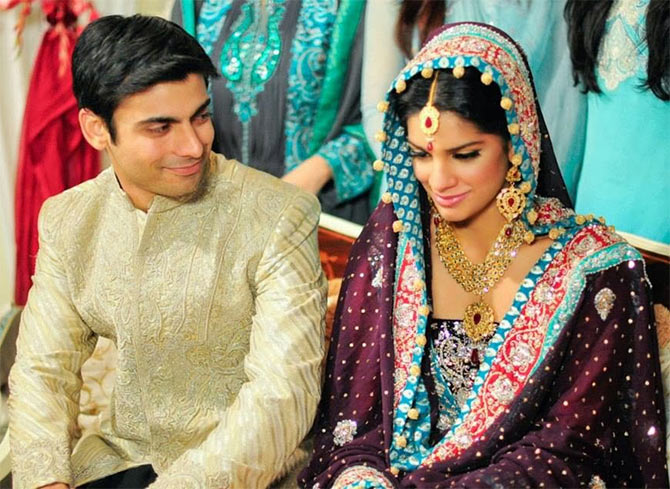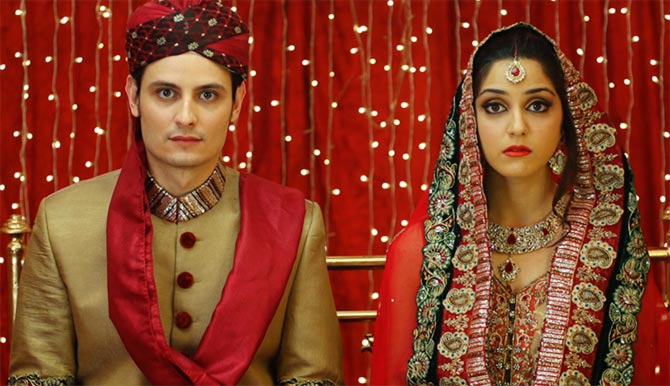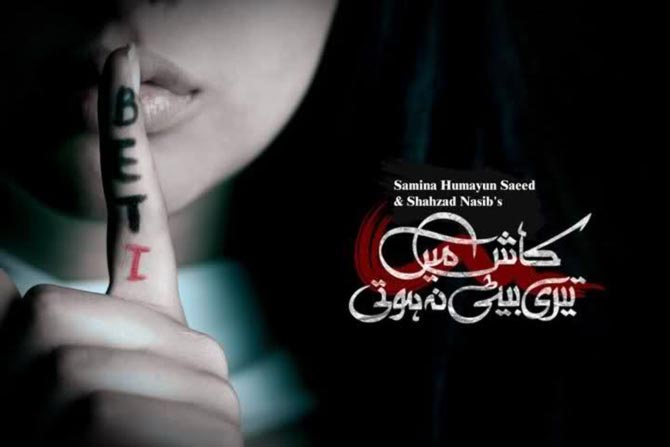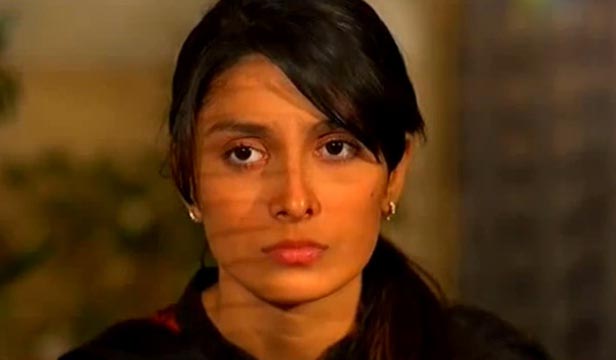Paloma Sharma/Rediff.com in Mumbai
Television's new channel Zindagi has some beautiful stories from across the border.
When Zee Entertainment Enterprises Limited launched Zindagi -- a channel that features daily soaps from beyond the border -- on June 23, it came as nothing short of bad news for youngsters, who had been subjected to the torture of K-serials for as long as they could remember.
“Humare serials kaafi nahi the kya?” asked a dejected classmate.
Thankfully, Zindagi proved us wrong.
Although it only runs four shows at the moment, Zindagi does the what our generation thought would be impossible -- it gives you a chance to watch something in Hindi (albeit mixed with a bit of Punjabi and Urdu) without having to either resort to insipid saas-bahu serials or equally insipid comedy shows.
This does not mean that Zindagi doesn't have its fair share of tearjerkers or that melodrama doesn't prevail at times. But the quality of scripts, acting, direction and production design should be enough to get you hooked, or at least make you curious enough to watch more than once.
1. Zindagi Gulzar Hai
Time: 8:00 pm to 8:55 pm, daily
Based on Umera Ahmed's novel of the same name, Zindagi Gulzar Hai is narrated by its protagonists -- Kashaf Murtaza (Sanam Saeed) and Zaroon Junaid (Fawad Khan) -- who stand divided by the barb wires of gender and class.
Kashaf is the eldest of the three daughters of Rafia, a government school principal, and Murtaza, an absentee father who abandoned Rafia and remarried in order to obtain a son.
Zaroon is the eldest child and only son of a wealthy couple and despite having liberal parents and a comfortable upbringing, he is growing increasingly (annoyingly) chauvinistic each day -- to the point where he tells his sister and best friend about what is the right kind of dress to wear in public and what is not.
Kashaf's family is poor and she gets into a reputed university on a scholarship, and though Zaroon has always stood first, he loses the top spot to Kashaf. This creates friction between them. The two are in the race for the top position in the class, and as differences spill out, the fight gets uglier.
An eerie reminder of a Jane Austen novel, perhaps a Pakistani Pride and Prejudice, Zindagi Gulzar Hai has had a smooth start. It incorporates several issues in its storyline that Indian women will find easy to connect with. It also does not shy away from portraying the glaring differences between the lives of the haves and the have nots, using its protagonists as personifications of their respective ideologies.
Where, on one hand, Kashaf is upset that though life goes on, her family's struggles never end, on the other hand, Zaroon believes that a lack of struggle has rendered him good for nothing and cannot imagine why people only want luxury.
Although Kashaf is easy to sympathize with, Zaroon's sense of entitlement often makes you want to smack him across the face (something, I hope, will change soon).
Sanam Saeed is aptly cast as an angry young girl, and portrays Kashaf's awkward yet self-assured demeanor, perfectly.
Fawad Khan, for his part, is as cocky (read: creepy) as I imagine any real life Zaroon would be, with his pseudo-liberal values and an almost permanently raised eyebrow.
However, the one to watch out for is Kashaf's ammi, Rafia, played by Samina Peerzada.
Peerzada, who had left the big screen for television a while ago, walks the fine line between drama and melodrama perfectly. She and Saeed complement each other so much that you think they really could be mother and daughter.
Zindagi Gulzar Hai sees Sultana Siddiqui come back to direction after almost a decade but she doesn't seem to have forgotten her craft. Siddiqui controls the show with an iron fist, never letting the plot falter.
Although slightly predictable and sometimes packed with far too many internal monologues, Zindagi Gulzar Hai manages to provide great insight into Pakistan's class and gender conflict, and makes you realise that their society isn't much different from ours.
Rediff Rating:![]()
Please click NEXT for more.
Aunn Zara
Image: A still from Aunn ZaraPaloma Sharma/ Rediff.com in Mumbai
Time: 8:55 pm – 9:45 pm, daily
Who knew being the only son could be such a hard job?
Aunn (Osman Khalid Butt), a man in his late 20s, lives with his dadi, ammi, phupo and phupo's two young daughters, and is the apple of all their eyes.
His mother drives him to office, his grandmother makes his hair and his aunt is constantly trying to ward off the evil eye, which she is convinced is after him.
But Aunn has become tired of the attention and when he complains to his best (perhaps only) friend Manzar (Mukarram Kaleem), Mazar advises him to get married in order to escape his family's suffocating idea of love.
Zara (Maya Ali) is the only daughter of a strict, discipline-loving army officer. A motherless child, Zara has lived with her father and grandfather almost all her life, and though her father does love her, he is unable to express the affection she longs for.
Her friend suggests the same solution as Mazar -- marriage.
Aunn and Zara do eventually get married, but, as romantic comedies are expected to go, they find each other intolerable. Their ploys to outshine the other, along with their eccentric family members, lead to funny situations and funnier dialogue.
Let's face it, we all know where Aunn Zara is headed, but the destination is really nobody's concern when the journey is so amusing.
Based on Faiza Iftikhar's novel, Hisaar-e-Mohabbat, and directed by Haissam Hussain, Aunn Zara borrows its cast liberally from Ek Nayee Cinderella (which was, incidentally, written and directed by the same people). However, Butt and Ali have come a long way from their Cinderella days and appear to be completely at ease this time, as compared to their previously wooden state.
Aunn Zara's witty dialogues will be particularly difficult to grasp for those who neither have a good command over Hindi nor basic knowledge of Urdu and Punjabi but Indian audiences will connect to the family-based setup of the show.
The simplicity of the plot and unpretentious characters make Aunn Zara the most endearing programme on Zindagi.
Rediff Rating: ![]()
Kash Mein Teri Beti Na Hoti
Image: Movie poster of Kash Mein Teri Beti Na HotiPaloma Sharma/ Rediff.com in Mumbai
Time: 9:45 pm – 10:15 pm, daily
"Itni bhi pagli nahi hoon main!"
Seems out of place?
It did to me too, at first. I was naive enough to think that it might be a one-time thing. Alas, it was not to be!
Khushi aka Pagli (Fatima Effendi) is a happy-go-lucky girl who often behaves like an eight-year-old with the brain of a monkey and yet, seems to have the rationality to spot a wrongdoing where her elders choose to turn their backs. More annoying than endearing, Pagli is the eldest of three children -- two daughters and a son -- and washes windshields at the traffic signal with her younger sister while her younger brother works under a mechanic in order to make enough money for their poverty-stricken family.
Their father, Akbar Ali, becomes paralysed and can no longer sell newspapers.
Hence, when the proposal comes along, Pagli's mother (Salma Zafar) decides to sell her into a year long marriage which will end in divorce once she has produced an heir for an already married, wealthy man. However, Pagli doesn't know that she is being sold and actually believes her mother's version, that Pagli is getting married to her childhood sweetheart who has come back for her after several years.
Kash Mein Teri Beti Na Hoti is a horrible mix unappealing proportions. While it displays perfection in certain departments, the drama is so pathetically lacking in others.
Director Syed Ali Raza shoots this TV series like a feature film, playing with the light and creating deliciously dark frames. Although he tried to handle issues like trafficking and poverty with sensitivity, his lead actress is hellbent on sensationalizing things.
If only Fatima Effendi would not overact, and remember not to enlarge her eyes to an inhuman extent, or to shut her ever-gaping mouth in scenes where such behavior is not needed. It is unclear whether her the actors who play her parents look tired and frustrated because the script demands it or because they know that their hard work is going to go down the drain if Effendi doesn't take some acting lessons soon.
The script, though well written, needs a significant amount of editing. What could have been covered in one or two episodes took a whole week.
Character development is weak and the motives behind Pagli's actions or why she is so different from the children who grew up in the same conditions as her, remains unexplained.
Kash Main Teri Beti Na Hoti is like a washcloth that was dipped in a bucket of pain and twisted over and over again to extract every drop.
I cried while watching this show -- not because Pagli was being solid into a life of slavery but because I had watched it for over 30 minutes.
Rediff Rating: ![]()
Kitni Girhain Baqi Hain
Image: A still from Kitni Girhain Baqi HainPaloma Sharma/ Rediff.com in Mumbai
Time: 10: 15 pm – 11:00 pm, daily
Watching Kitni Girhain Baqi Hain is quite like playing a lucky draw.
Since the series is an anthology of 45 minute telefilms, you never really know what you're going to get. The telefilms reflect upon different aspects of women's lives and society, and are unrelated to each other in any way except for the common themes and the common narrator, Kirron Kher. Hence, it is almost impossible to critique the series as a whole.
Kitni Girhain Baqi Hain could have been shown on Doordarshan as easily as it is running on Zindagi and the feel of some of the telefilms will make you nostalgic for good, old DD programs. Others will seem similar to short stories you might vaguely remember from your school days.
Of the seven telefilms that were shown during the week, Aurat, Maa Aur Tanhai, SMS and Raaz were particularly interesting.
Aurat, Maa Aur Tanhai explored the loneliness of an elderly lady, the physical and emotional distance that her sons maintain, her denial of it and the eventual friendship between her and a stranger over the phone.
SMS talks about a brother's sense of entitlement over his sister and her life, and how, when she and the rest of his siblings play a prank on him, the issue of izzat (honour) comes up. Eventually, it turns into a lethal situation.
Raaz takes on sexual abuse of boys and women at the hands of adult males who dominate society either by means of wealth or due to the advantage gained by their position as a religious leader. Two adults are bound together in marriage but the husband's childhood trauma casts a dark shadow over their joint future.
While Bekhabri started off well, it fell into a cycle of cliches and lazy writing, eventually turning into something taken out of a cheap Hindi romance novel bought from the railway station.
Overall, Kitni Girhain Baqi Hain is a good enough watch with engaging performances and stories that make one reflect on the state of our society.
Rediff Rating: ![]()





Comment
article